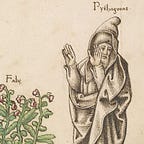Continuing our reading of the work organized by Marcel Detiene and Jean Pierre Vernant — The Cuisine of Sacrifice among the Greeks, another great dietary regime of antiquity is the Pythagorean. First of all, it deserves a consideration regarding the understanding of the expression ‘Pythagorean diet’.
Today we know Pythagoras mainly for his mathematics, it is not surprising to find statements that place him as the first philosopher to defend the vegetarian cause.
The problem is that Pythagoras did not leave any written documents.
All the stories about his life were written centuries after his death. The interesting thing is that the motivations that would have led him to abandon the animal diet seem to say more about who wrote them than about Pythagoras himself.
Diogenes Laërtius writes that, for Pythagoras conceiving the possibility of reincarnation, the question that emerges is: how to eat another animal when it can be your great-grandmother? To avoid such risks, the alternative was to abstain from the meat of non-human animals.
In Chapter XX of Ovid’s great poem Metamorphoses, Pythagoras is described poetically as someone who abstains not only because of metempsychosis, but because nature is more than enough to provide the necessary food to survive.
Although it usually serves as a reference to a diet free from animal consumption, not all Pythagoreans abstained from meat. It is the old problem of the difference between the master and the disciples.
Detienne teaches us that the Pythagoreans could be divided into two main groups:
👉 the Pure Pythagoreans, who constituted true “Pythagorean communities”, isolated from the urban environment and faithful to the master’s doctrine. They did abstain completely from meat consumption and sacrificed only grains and incenses.
👉 The second group assumed certain concessions, such as the replacement of lamb by goat, the working ox by a slice of kid. If we remember, the political-religious dimension of the city was founded through sacrificial practices and to deny blood sacrifice meant to reject the most important act of civil religion.
Despite never having disappeared completely, Pythagoreanism is rescued almost half a century later during the imperial period, under another key, similar to the phrase attributed to Nietzsche about the philosopher as one who shoots an arrow aimlessly, until another one retrieves it and launches it again.
Almost a millennium later, the rescue of Pythagoras served as inspiration for Neoplatonism, the last great pagan exponent of antiquity, however, in another key other than reincarnation, now in the sense of a spiritual asceticism.
